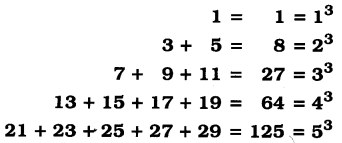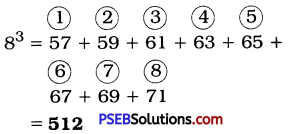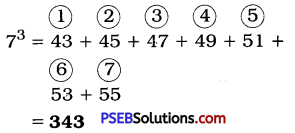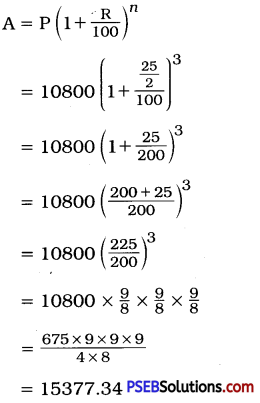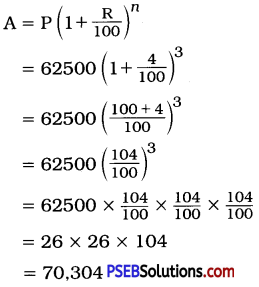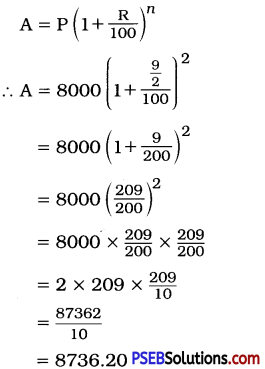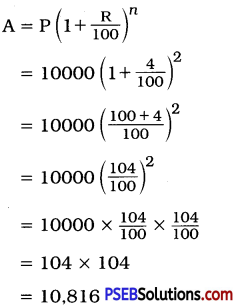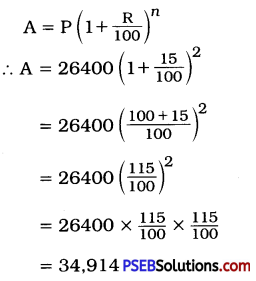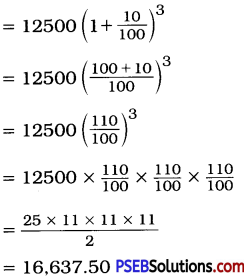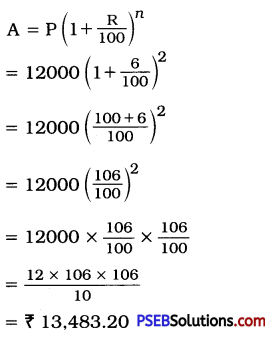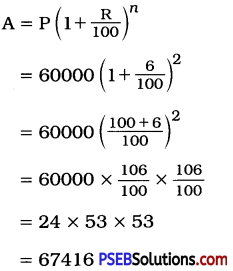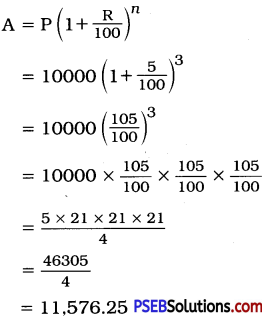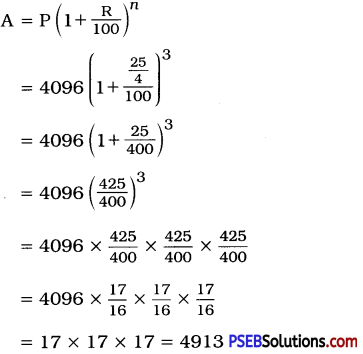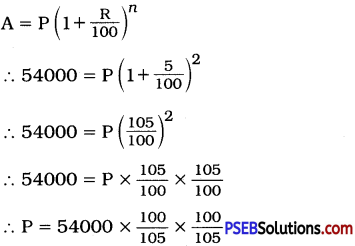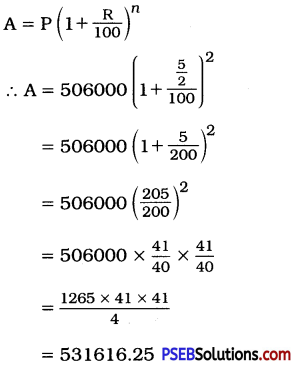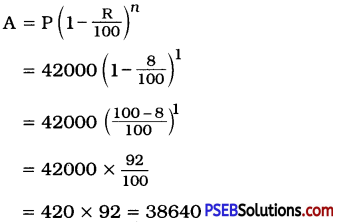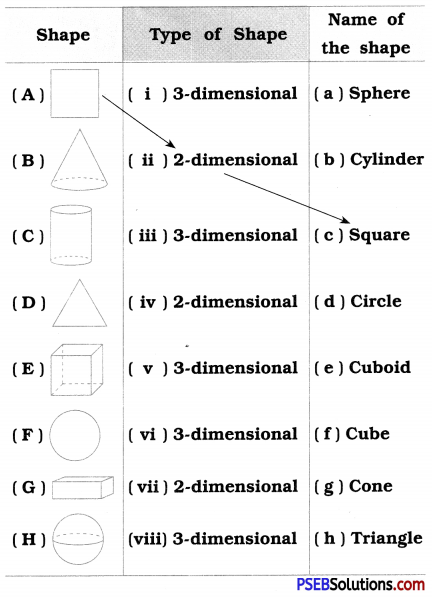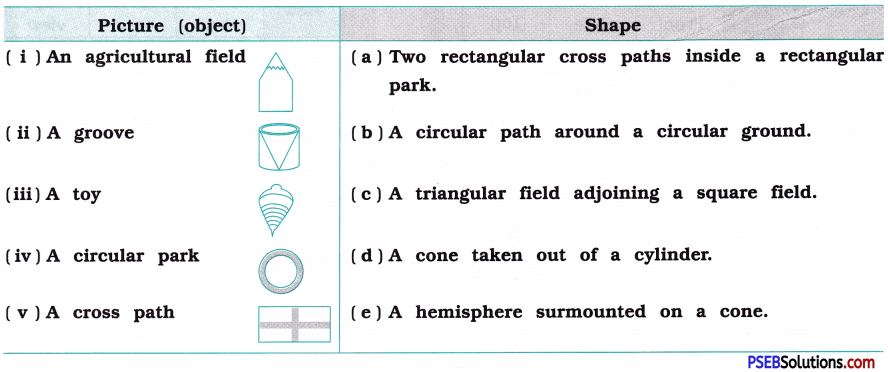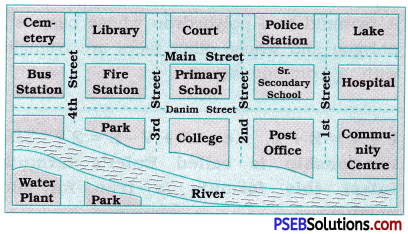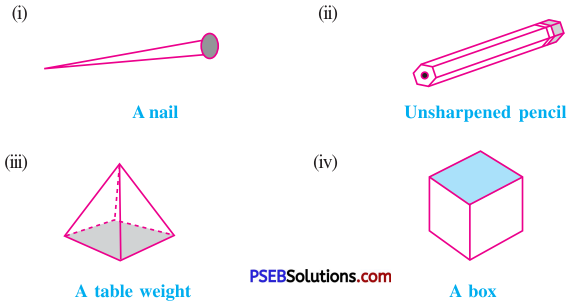Punjab State Board PSEB 8th Class Maths Book Solutions Chapter 9 Algebraic Expressions and Identities Ex 9.5 Textbook Exercise Questions and Answers.
PSEB Solutions for Class 8 Maths Chapter 9 Algebraic Expressions and Identities Ex 9.5
1. Use a suitable identity to get each of the following products:
Question (i)
(x + 3) (x + 3)
Solution:
= (x + 3)2
= (x)2 + 2(x)(3) + (3)2
[∵ (a + b)2 = a2 + 2ab + b2]
= x2 + 6x + 9
![]()
Question (ii)
(2y + 5) (2y + 5)
Solution:
= (2y + 5)2
= (2y)2 + 2 (2y)(5) + (5)2
[∵ (a – b)2 = a2 – 2ab + b2]
= 4y2 + 20y + 25
Question (iii)
(2a – 7) (2a – 7)
Solution:
= (2a – 7)2
= (2a)2 – 2(2a)(7) + (7)2
[∵ (a – b)2 = a2 – 2ab + b2]
= 4a2 – 28a + 49
Question (iv)
(3a – \(\frac {1}{2}\))(3a – \(\frac {1}{2}\))
Solution:
= (3a – \(\frac {1}{2}\))2
= (3a)2 – 2(3a)(\(\frac {1}{2}\)) + (\(\frac {1}{2}\))2
[∵ (a – b)2 = a2 – 2ab + b2]
= 9a2 – 3a + \(\frac {1}{4}\)
![]()
Question (v)
(1.1m – 0.4) (1.1m + 0.4)
Solution:
= (1.1m)2 – (0.4)2
[∵ (a + b) (a – b) = a2 – b2]
= 1.21m2 – 0.16
Question (vi)
(a2 + b2) (-a2 + b2)
Solution:
= (b2 + a2) (b2 – a2)
= (b2)2 – (a2)2
[∵ (a + b) (a – b) = a2 – b2]
= b4 – a4
Question (vii)
(6x – 7) (6x + 7)
Solution:
= (6x)2 – (7)2
[∵ (a + b) (a – b) = a2 – b2]
= 36x2 – 49
Question (viii)
(-a + c) (-a + c)
Solution:
= (-a + c)2
= (-a)2 + 2 (-a) (c) + (c)2
[∵ (a + b)2 = a2 + 2ab + b2]
= a2 – 2ac + c2
Question (ix)
(\(\frac{x}{2}+\frac{3 y}{4}\))
Solution:
= (\(\frac{x}{2}+\frac{3 y}{4}\))2
= (\(\frac {x}{2}\))2 + 2(\(\frac {x}{2}\))(\(\frac {3y}{4}\)) + (\(\frac {3y}{4}\))2
[∵ (a + b)2 = a2 + 2ab + b2]
= \(\frac{x^{2}}{4}+\frac{3 x y}{4}+\frac{9 y^{2}}{16}\)
![]()
Question (x)
(7a – 9b) (7a – 9b)
Solution:
= (7a – 9b)2
= (7a)2 – 2(7a)(9b) + (9b)2
[∵ (a – b)2 = a2 – 2ab + bsup>2]
= 49a2 – 126ab + 81b2
2. Use the identity (x + a) (x + b) = x2 + (a + b) x + ab to find the following products:
Question (i)
(x + 3) (x + 7)
Solution:
Identity : (x + a) (x + b) = x2 + (a + b) x + ab
= (x)2 + (3 + 7)x + (3) (7)
= x2 + (10) x + 21
= x2 + 10x + 21
Question (ii)
(4x + 5) (4x + 1)
Solution:
= (4x)2 + (5 + 1) 4x + (5)(1)
= 16x2 + (6) 4x + 5
= 16x2 + 24x + 5
Question (iii)
(4x – 5) (4x – 1)
Solution:
= (4x)2 + (- 5 – 1) 4x + (- 5) (- 1)
= 16x2 + (- 6) 4x + 5
= 16x2 – 24x + 5
![]()
Question (iv)
(4x + 5) (4x- 1)
Solution:
= (4x)2 + (5 – 1) 4x + (5) (- 1)
= 16x2 + (4) 4x – 5
= 16x2 + 16x – 5
Question (v)
(2x + 5y) (2x + 3y)
Solution:
= (2x)2 + (5y + 3y) 2x + (5y) (3y)
= 4x2 + (8y) 2x + 15y2
= 4x2 + 16xy + 15y2
Question (vi)
(2a2 + 9) (2a2 + 5)
Solution:
= (2a2)2 + (9 + 5) 2a2 + (9)(5)
= 4a4 + (14)2a2 + 45
= 4a4 + 28a2 + 45
Question (vii)
(xyz – 4) (xyz – 2)
Solution:
= (xyz)2 + (- 4 – 2) xyz + (- 4)(- 2)
= x2y2z2 + (- 6) xyz + 8
= x2y2z2 – 6xyz + 8
3. Find the following squares by using the identities:
Question (i)
(b – 7)2
Solution:
= (b)2 – 2 (b)(7) + (7)2
[∵ (a – b)2 = a2 – 2ab + b2]
= b2 – 14 b + 49
![]()
Question (ii)
(xy + 3z)2
Solution:
= (xy)2 + 2 (xy)(3z) + (3z)2
[∵ (a + b)2 = a2 + 2ab + b2]
= x2y2 + 6xyz + 9z2
Question (iii)
(6x2 – 5y)2
Solution:
= (6x2)2 – 2 (6x2) (5y) + (5y)2
[∵ (a – b)2 = a2 – 2ab + b2]
= 36x4 – 60x2y + 25y2
Question (iv)
(\(\frac {2}{3}\)m + \(\frac {3}{2}\)n)2
Solution:
= (\(\frac {2}{3}\)m)2 + 2(\(\frac {2}{3}\)m)(\(\frac {3}{2}\)n) + (\(\frac {3}{2}\)n)2
[∵ (a + b)2 = a2 + 2ab + b2]
= \(\frac {4}{9}\)m2 + 2mn + \(\frac {9}{4}\)n2
Question (v)
(0.4p – 0.5q)2
Solution:
= (0.4p)2 – 2 (0.4p)(0.5q) + (0.5q)2
[∵ (a – b)2 = a2 – 2ab + b2]
= 0.16p2 – 0.4pq + 0.25q2
![]()
Question (vi)
(2xy + 5y)2
Solution:
= (2xy)2 + 2 (2xy)(5y) + (5y)2
[∵ (a + b)2 = a2 + 2ab + b2]
= 4x2y2 + 20xy2 + 25 y2
4. Simplify:
Question (i)
(a2 – b2)2
Solution:
= (a2)2 – 2(a2)(b2) + (b2)2
= a4 – 2a2b2 + b4
Question (ii)
(2x + 5)2 – (2x – 5)2
Solution:
= [(2x)2 + 2(2x)(5) + (5)2] – [(2x)2 – 2 (2x)(5) + (5)2]
= [4x2 + 20x + 25] – [4x2 – 20x + 25]
= 4x2 + 20x + 25 – 4x2 + 20x – 25
= 4x2 – 4x2 + 20x + 20x + 25 – 25
= 40x
Question (iii)
(7m – 8n)2 + (7m + 8n)2
Solution:
= [(7m)2 – 2(7m)(8n) + (8n)2] + [(7m)2 + 2 (7m)(8n) + (8n)2]
= [49m2 – 112mn + 64n2] + [49m2 + 112mn + 64n2]
= 49m2 – 112mn + 64n2 + 49m2 + 112mn + 64n2
= 49m2 + 49m2 – 112mn + 112mn + 64n2 + 64n2
= 98m2 + 128n2
![]()
Question (iv)
(4m + 5n)2 + (5m + 4n)2
Solution:
= [(4m)2 + 2 (4m)(5n) + (5n)2] + [(5m)2 + 2 (5m)(4n) + (4n)2]
= 16m2 + 40mn + 25n2 + 25m2 + 40mn + 16n2
= 16m2 + 25m2 + 40mn + 40 mn + 25n2 + 16n2
= 41m2 + 80mn + 41n2
Question (v)
(2.5p – 1.5q)2 – (1.5p – 2.5q)2
Solution:
= [(2.5p)2 – 2 (2.5p)(1.5q) + (1.5q)2] – [(1.5p)2 – 2 (1.5p)(2.5q) + (2.5q)2]
= [6.25p2 – 7.5pq + 2.25q2] – [2.25p2 – 7.5pq + 6.25q2]
= 6.25p2 – 7.5pq + 2.25q2 – 2.25p2 + 7.5pq – 6.25q2
= 6.25p2 – 2.25p2 – 7.5pq + 7.5pq + 2.25q2 – 6.25q2
= 4p2 – 4q2
Question (vi)
(ab + bc)2 – 2ab2c
Solution:
= [(ab)2 + 2 (ab)(bc) + (bc)2] – 2ab2c
= a2b2 + 2ab2c + b2c2 – 2ab2c
= a2b2 + 2ab2c – 2ab2c + b2c2
= a2b2 + b2c2
Question (vii)
(m2 – n2m)2 + 2m3n2
Solution:
= [(m2)2 – 2 (m2)(n2m)2 + (n2m)2] + 2m3n2
= m4 – 2 m3n2 + n4m2 + 2 m3 n2
= m4 – 2 m3n2 + 2 m3n2 + n4m2
= m4 + m2n4
![]()
5. Show that:
Question (i)
(3x + 7)2 – 84x = (3x – 7)2
Solution:
LHS = (3x + 7)2 – 84x
= (3x)2 + 2(3x)(7) + (7)2 – 84x
= 9x2 + 42x + 49 – 84x
= 9x2 + 42x – 84x + 49
= 9x2 – 42x + 49
RHS = (3x – 7)2
= (3x)2 – 2(3x)(7) + (7)2
= 9x2 – 42x + 49
Thus, LHS = RHS
∴ (3x + 7)2 – 84x = (3x – 7)2
Question (ii)
(9p – 5q)2 + 180pq = (9p + 5q)2
Solution:
LHS = (9p – 5q)2 + 180pq
= (9p)2 – 2(9p)(5q) + (5q)2 + 180pq
= 81p2 – 90pq + 25q2 + 180pq
= 81p2 – 90pq + 180pq + 25q2
= 81p2 + 90pq + 25q2
RHS = (9p + 5q)2
= (9p)2 + 2(9p)(5q) + (5q)2
= 81p2 + 90pq + 25q2
Thus, LHS = RHS
∴ (9p – 5q)2 + 180pq = (9p + 5q)2
![]()
Question (iii)
(\(\frac {4}{3}\)m – \(\frac {3}{4}\)n)2 + 2mn = \(\frac {16}{9}\)m2 + \(\frac {9}{16}\)n2
Solution:
LHS = [\(\frac {4}{3}\)m – \(\frac {3}{4}\)n]2 + 2mn
= [(\(\frac {4}{3}\)m)2 – 2(\(\frac {4}{3}\)m)(\(\frac {3}{4}\)n) + (\(\frac {3}{4}\)n)2] + 2mn
= \(\frac {16}{9}\)m2 – 2mn + \(\frac {9}{16}\)n2 + 2mn
= \(\frac {16}{9}\)m2 – 2mn + 2mn + \(\frac {9}{16}\)n2
= \(\frac {16}{9}\)m2 + \(\frac {9}{16}\)n2 = RHS
Thus, LHS = RHS
∴ (\(\frac {4}{3}\)m – \(\frac {3}{4}\)n)2 + 2mn = \(\frac {16}{9}\)m2 + \(\frac {9}{16}\)n2
Question (iv)
(4pq + 3q)2 – (4pq – 3q)2 = 48pq2
Solution:
LHS = (4pq + 3q)2 – (4pq – 3q)2
= [(4pq)2 + 2 (4pq)(3q) + (3q)2] – [(4pq)2 – 2 (4pq)(3q) + (3q)2]
= [16p2q2 + 24pq2 + 9q2] – [16p2q2 – 24pq2 + 9q2]
= 16p2q2 + 24pq2 + 9q2 – 16p2q2 + 24pq2 – 9q2
= 16p2q2 – 16p2q2 + 24pq2 + 24pq2 + 9q2 – 9q2
= 48pq2 = RHS
Thus, LHS = RHS
∴ (4pq + 3q)2 – (4pq – 3q)2 = 48pq2
![]()
Question (v)
(a – b) (a + b) + (b – c) (b + c) + (c – a) (c + a) = 0
Solution:
LHS = (a – b)(a + b) + (b – c)(b + c) + (c – a) (c + a)
= (a2 – b2) + (b2 – c2) + (c2 – a2)
= a2 – b2 + b2 – c2 + c2 – a2
= a2 – a2 + b2 – b2 + c2 – c2
= 0 = RHS
Thus, LHS = RHS
∴ (a -b)(a + b) + (b- c) (b + c) + (c – a) (c + a) = 0
6. Using identities, evaluate:
Question (i)
712
Solution:
= (70 + 1)2
= (70)2 + 2 (70)(1) + (1)2
[∵ (a + b)2 = a2 + 2ab + b2]
= 4900 + 140 + 1
= 5041
Question (ii)
992
Solution:
= (100 – 1)2
= (100)2 – 2(100)(1) + (1)2
[∵ (a – b)2 – a2 – 2ab + b2]
= 10000 – 200 + 1
= 9801
![]()
Question (iii)
1022
Solution:
= (100 + 2)2
= (100)2 + 2 (100)(2) + (2)2
[∵ (a + b)2 = a2 + 2ab + b2]
= 10000 + 400 + 4
= 10404
Question (iv)
9982
Solution:
= (1000 – 2)2
= (1000)2 – 2 (1000)(2) + (2)2
[∵ (a – b)2 = a2 – 2ab + b2]
= 1000000 – 4000 + 4
= 996004
Question (v)
5.22
Solution:
= (5 + 0.2)2
= (5)2 + 2 (5)(0.2) + (0.2)2
[∵ (a + b)2 = a2 + 2ab + b2]
= 25 + 2 + 0.04
= 27 + 0.04
= 27.04
Question (vi)
297 × 303
Solution:
= (300 – 3) × (300 + 3)
= (300)2 – (3)2
[∵ (a – b)(a + b) = a2 – b2]
= 90000 – 9
= 89991
![]()
Question (vii)
78 × 82
Solution:
= (80 – 2) × (80 + 2)
= (80)2 – (2)2
[∵ (a – b)(a + b) = a2 – b2]
= 6400 – 4
= 6396
Question (viii)
8.92
Solution:
= (9 – 0.1)2
= (9)2 – 2(9)(0.1) + (0.1)2
[∵ (a – b)2 = a2 – 2ab + b2]
= 81 – 1.8 + 0.01
= 81.01 – 1.8
= 79.21
Question (ix)
10.5 × 9.5
Solution:
= (10 + 0.5) × (10 – 0.5)
= (10)2 – (0.5)2
[∵ (a + b)(a – b) = a2 – b2]
= 100 – 0.25
= 99.75
![]()
7. Using a2 – b2 = (a + b) (a – b), find:
Question (i)
512 – 492
Solution:
= (51 + 49) (51 – 49)
= (100) × (2)
= 200
Question (ii)
(1.02)2 – (0.98)2
Solution:
= (1.02 + 0.98) (1.02 – 0.98)
= (2.0) × (0.04)
= 0.08
Question (iii)
1532 – 1472
Solution:
= (153 + 147) (153 – 147)
= (300) × (6)
= 1800
Question (iv)
12.12 – 7.92
Solution:
= (12.1 + 7.9) (12.1 – 7.9)
= 20 × 4.2
= 84
![]()
8. Using (x + a)(x + b) = x2 + (a + b) x + ab, find:
Question (i)
103 × 104
Solution:
= (100 + 3) × (100 + 4)
= (100)2 + (3 + 4) × 100 + (3)(4)
= 10000 + 700 + 12
=10712
Question (ii)
5.1 × 5.2
Solution:
= (5 + 0.1) (5 + 0.2)
= (5)2 + (0.1 + 0.2) × 5 + (0.1)(0.2)
= 25 + (0.3) × 5 + 0.02
= 25 + 1.5 + 0.02
= 26.52
Question (iii)
103 × 98
Solution:
= (100 + 3) (100-2)
= (100)2 + (3 – 2) 100 + (3)(-2)
= 10000 + 100 – 6
= 10094
![]()
Question (iv)
9.7 × 9.8
Solution:
= (10 – 0.3) (10 – 0.2)
= (10)2 + [(-0.3) + (-0.2)] 10 + (-0.3) (-0.2)
= 100 + [-0.5] × 10 + 0.06
= 100 – 5 + 0.06
= 95.06

